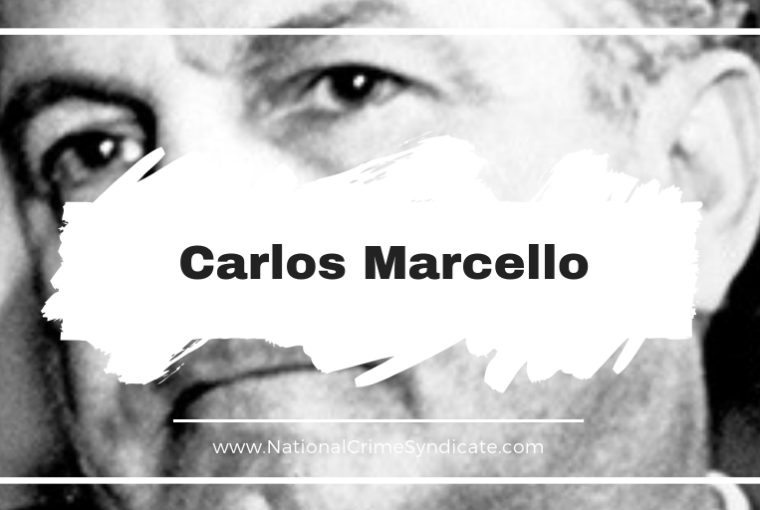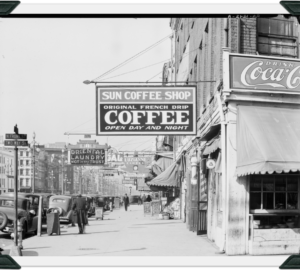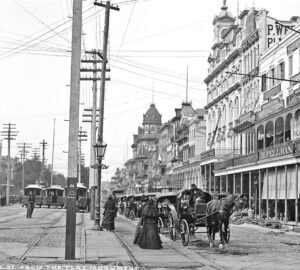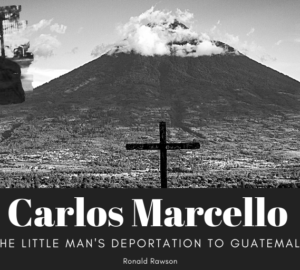Today marks the birthday of the Little Guy, The Tomato Salesman. The one time Godfather of New Orleans and the South, Carlos Marcello. When I first started digging into all of the New Orleans history I was of the mind that I wouldn’t focus too much on the Little Guy. I knew about him of course, knew the basic history and the more famous stories and was more than familiar with the JFK angle. I didn’t want to re-write all the same things everyone had already read and heard about him. I wanted to focus more on those things, events and people that I knew nothing about. I did and have learned a lot but in looking into all those other things I did manage to learn some about Marcello along the way as well as correct some things I thought I knew but didn’t have quite right.
I still focus on trying to learn about the lesser known wiseguys and events of the New Orleans underworld as I find enjoyment in that but have gained a stronger respect for Marcello. He managed to hold on to power the longest out of all the other New Orleans bosses and seemingly with less strife internally. FBI files show that they had informants in or near Marcello but there never was a family member that flipped. You could argue that he was given a damn good start on things when the family was handed to him in 1947 and while this is true he built it up into something I think the guys before him could only dream of and by all accounts he had the respect of the other bosses from around the country.
Joe Valachi told the McClellan investigators something to the effect of:
“I was thinking of going to New Orleans at one time and asked Vito Genovese about it. He told me I needed permission from Carlos Marcello to go to his town. Vito said I shouldn’t even go.”
Even a psychopath like Vito Genovese respected Marcello! When Immigration had him shanghaied and shipped to Guatemala he thumbed his nose at the government and gave Robert Kennedy the proverbial finger when he returned to New Orleans. Depending on what you believe he had a president clipped and got away clean and for all of the things he was into, all of the money he made illegally, he spent relatively little time in jail. You could say it was over for him when he did go that final and there’s some truth in that but he was still THE MAN up until his death in 1993.
I’ve read accounts of Frank Gagliano telling some New York boys that the Marcello’s were finished in Louisiana when approached by them asking if there would be any problems with them operating in New Orleans. None of this happened or was said until AFTER Marcello’s death.
So I have warmed up to the idea of writing some about Carlos. Some things I see around internet land are incomplete and some are just plain wrong. Don’t really want to do one long piece but to do it in increments and provide more detail in areas. If it’s not already up in the Crescent Corner there will soon be the first in a three part series on the famous La Stella meeting in 1966. I plan on eventually covering everything about Marcello with the exception of the JFK assassination. WAY too big of a story that goes down so many roads it’s mind boggling. I’ll let someone smarter than me and with way more patience than I have cover that. I’ll just say that I find it impossible to believe he had nothing to do with it. Just too many “coincidental” connections in my opinion.
So just to mark his birthday (he would be 107 this year) I thought I’d do a little piece on his early, REALLY early days.
Born in Tunis, French Tunisia on February 6 1910 as Calogero Minacori (or Minacore) to Giuseppe and Luigia Minacori. Giuseppe and Luigia were Sicilians from the town of Ravanusa, in the Province of Agrigento. They had married in 1908 and soon after went to Tunis to find work. They stayed in the area of Carthage for about a year and a half until Giuseppe went on ahead to America looking for better prospects. She gave birth to Calogero in Tunis while awaiting for Giuseppe to send for her. Giuseppe had landed in New Orleans and found work on a plantation which provided enough money to send for his wife and young son and get them on a ship bound for New Orleans. When the ship the Liguria docked in New Orleans a detective and customs officials boarded the ship to question passengers. This process had been put in place two decades earlier after the events of 1890/1891 in the David Hennessey case in an effort to combat the Mafia. After clearing screening Luigia stepped off the ship to a waiting Giuseppe who had never seen his son.
Giuseppe had found work on a sugar plantation and this is where he brought his young family. The story goes that the overseer of the plantation didn’t like that an underling had the same name, Minacori, as he did and forced the name Marcello on the family which is typically a more Northern Italian name. After a time working on the sugar plantation the, now, Marcello family was able to purchase their own property and work the land. They moved into a crumbling house on a plantation called Stanford Plantation (see below) and began to grow vegetables to sell in the French Market in New Orleans.

The location of the property was in Algiers on the west bank almost directly across the Mississippi River from New Orleans. After a time Giuseppe and Luigia became naturalized citizens and Americanized their names to Joseph and Louise. Their children that were born later automatically became American citizens but for some unknown reason they never had Calogero, who they now called Carlos, naturalized. This would plague Carlos in later years.

By all accounts Carlos grew up in the image of his father. Short yet stocky and strong. Working the family farm produced a strong work ethic in the young man. When Carlos was of an age that he could handle a horse and cart he was tasked with bringing the results of their labor to sell in the French Market on Decatur Street. It’s not thought that Joseph had any connection to the Mafia in Ravanusa but the area did have a tradition of the Mafia mindset. Whether any of this was passed on to Carlos from his father can’t be said but the French Market at this time had been under Mafia/Blackhand control for years and it was inevitable that the young Carlos would be exposed to this. It’s not certain when Carlos started to make his trips across the river on the Algiers ferry to the French Market but it’s most likely long after Silver Dollar Sam Carollo was running things in New Orleans.

At the age of 18 Carlos moves from the family farm to the Veaux Carre across the river and rents a room for $2 a week. In those days the French Quarter was quite different from what we know now and was seen more as a breeding ground of poverty and crime. Having dropped out of school at the age of 14 he had most likely cultivated contacts made at the French Market with the underlings of Carollo.
By accounts the young Carlos made his way pulling off small burglaries and such until 1929. Marcello, along with three accomplices, robbed a bank in Algiers getting away with seven thousand dollars. The bank wasn’t too far from Stanford Plantation and after abandoning their getaway car the group made their way there. Carlos asked his father to hide the cash which Joseph agreed to do for a small cut and then buried the money on his farm. Apparently afraid that his father could get in serious trouble Peter Marcello went to the Algiers police and told them of his family’s involvement in the crime. When the police arrived they forced Joseph to produce the loot and detained him, Carlos, Peter and one of the accomplices in the crime. Evidently the bank was satisfied to get the money back and charges were dropped against the group. Though the heist ultimately was a wash young Carlos got attention. Undeterred, Carlos began planning his next heist which was a grocery store in Algiers. He recruited two teenage boys, one who was 13 years old and the other 16, to perform the robbery in order to obtain enough cash to buy guns to plan his next robbery which was of the same bank he had robbed a few months before! To carry out the robbery Carlos rented a pistol for $5 and stole a car. Carlos gave the two boys detailed instructions on how to carry out the robbery, handed them the rented pistol and drove them to the store where they successfully grabbed $65.

In the following weeks Carlos planned the robbery of the bank with his two amici and they went to his French Quarter apartment on a few occasions. Close to the day of the robbery the clerk who had been in the grocery store when it was robbed spotted the two boys on a street in Algiers and had them arrested and they spilled the whole tale of the robbery, including Carlos’s involvement.
Carlos was arrested and the papers got a hold of the story and started referring to him as Fagin, from the Charles Dickens story Oliver Twist, who recruited baby bandits. Carlos was convicted, the only one of the three, and sent to Angola on May 28 1930 for 9 to 12 years.

He was at first assigned to the license plate factory but soon wiggled his way into an easier job as the wardens yard boy. In his time doing this he became aware of an illicit affair the warden was conducting with a female cook in the prison (whether a prisoner or employee wasn’t specified) and Carlos blackmailed the warden into granting him special favors. One of which was access to the kitchen area which brought him into contact with the female cook who Carlos then had relations with. During this time his father Joseph was working on getting his son released from prison and he eventually was able to persuade people close to Governor O.K. Allen to lobby on behalf of his son which they did.

The Governor pardoned the young Carlos and he was released only four years into his sentence.
When he returned to the French Quarter he was well known to the underworld of New Orleans. Carlos probably reflected on mistakes made in his first couple of years in his life of crime and though it wouldn’t be the last prison stint for him he seemed to learn some lessons that would later serve him well.
He would later famously have a sign in his Churchill Farms office that read Three Can Keep a Secret if Two are Dead.
- What’s This Silver Dollar Shit! That’s Sam Carollo! - June 26, 2023
- New Orleans Sets a Record - April 11, 2022
- Carlos Marcello Takes A Vacation: The Little Man’s Deportation to Guatemala Pt. 2 - June 11, 2021








